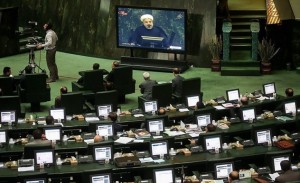 Tehran, April 15, IRNA - On Sunday, Iran?s parliament voted in favor of a bill to prevent the declining birth rate in the country.
Tehran, April 15, IRNA - On Sunday, Iran?s parliament voted in favor of a bill to prevent the declining birth rate in the country.Should the bill become law, any action including but not limited to abortion, sterilization, vasectomy as well as advertisement on lowering offspring will be considered illegal and offenders will be dealt with according to Islamic laws and on top of that the budget on population curbs has been halted, the English-language daily ?Tehran Times? reported on Tuesday.
Out of the 204 representatives present in the Majlis, 131 voted in favor of the bill, 43 against and one abstention.
Proponents of the bill argue that Iran has the potential to expand a population of 300 millions.
The bill is intended to deal with the country?s graying population and to promote a baby boom and larger families.
Hossein-Ali Shahriari, the Zahedan representative in the Majlis and one of the architects of bill said that in 22 years or so the population growth of Iran will reach zero.
According to statistics released in 1390 (March 2011-March 2012) the fertility rate in Iran has dropped to less than two children per couple and that 14 percent of families have no children and about 20 percent of families have only one child.
Ahmad Salak, an MP from Isfahan, spoke in favor of the bill, saying the Iranian population is getting grey and it is necessary to halt birth contol policies.
Iran�s birthrate reached a peak of 3.6 children per couple after the 1979 Islamic Revolution. By 1990, experts estimated Iran could be home to 140 million people if the rate was left unchecked.
Experts say that Iran�s population growth could reach zero in the next 20 years if the current trend is not reversed.
Unemployment, which officially stands at 12 percent, inflation standing at 36 percent, and lack of housing and job insecurity are the top most important reasons for decrease in fertility rate in the country.
A drop in marriages and a rise in divorce are also other reasons for the declining birth rate. Out of some 23 million Iranians eligible to marry, 11 million remain single.
MP Mehrdad Lahouti who represents the city Langroud in the parliament spoke against the bill, saying economic hardship is the main reason behind the declining birth rate.
�One of the main points which should be taken into consideration is economic problems and the architects of the plan should give explanations that what incentives have we given to young people to marry,� he noted.
Younes Assadi, a lawmaker from Meshkin Shahr, also opposed the bill, saying people�s need to job, housing, and education should be taken into consideration in increasing population.
By IRNA
The Iran Project is not responsible for the content of quoted articles.










